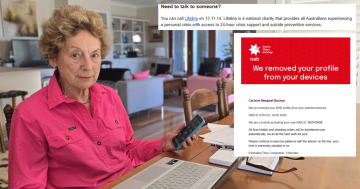
NSW Police warn people not to send money to strangers they meet online. Photo: file.
Griffith Police have warned residents to be wary of strangers they meet online, after a man was allegedly blackmailed after exposing his genitals to a Tinder match on the instant messaging app Snapchat.
Inspector Glenn Smith informed Region that the victim matched with an unknown woman on the dating app in November 2023. The pair started chatting and she told him she worked at a local business on Griffith’s main street Banna Avenue, but did not give him her name.
The victim became comfortable with the woman and the pair agreed to continue their conversation over Snapchat. A short time later, they started a video call. The man revealed his full face, but the woman would only show half of hers. The victim then filmed his genitals and the woman allegedly recorded this without his knowledge before abruptly disconnecting from Snapchat.
Two minutes later, the victim received a hand-held recorded video of him exposing his genitals on a YouTube page belonging to his Tinder match. The woman allegedly told him the video was not yet uploaded to YouTube for full public viewing, but that she would do so if he didn’t pay her $500. When he refused to do so, the woman sent him a list of his Facebook friends and threatened to send the images to his family and contacts via the social media site.
The victim then transferred $500 to the woman via a money transfer app called Wise. After the money transfer, the victim deleted the woman from both Tinder and Snapchat.
NSW Police provide the following advice to avoid being a victim of online dating scams:
Keep your personal details personal: Never share personal information or photos with someone you don’t know and trust – especially photos or webcam calls of a private nature. There have been reports of scammers using this material to blackmail victims.
Watch out: If an online admirer asks to communicate with you outside the dating website, such as through a private email address or over the phone, watch out – they could be trying to avoid detection. If you are considering meeting in person, choose a public place and let family or friends know where you are at all times.
Search: Run a Google Image search to check the authenticity of any photos provided. Scammers often use fake photos they’ve found online.
Think twice: Never send money to someone you’ve met online, especially via money order, wire transfer or international funds transfer – it’s rare to recover money sent this way.
Report: If you think you have provided your account details to a scammer, contact your bank or financial institution immediately.
















